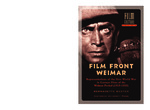Film Front Weimar
Representations of the First World War in German Films from the Weimar Period (1919-1933)
| dc.contributor.author | Kester, Bernadette | |
| dc.date.accessioned | 2010-12-31 23:55:55 | |
| dc.date.accessioned | 2019-12-10 14:46:32 | |
| dc.date.accessioned | 2020-04-01T15:33:53Z | |
| dc.date.available | 2020-04-01T15:33:53Z | |
| dc.date.issued | 2002 | |
| dc.identifier | 340236 | |
| dc.identifier | OCN: 437106753 | en_US |
| dc.identifier.uri | http://library.oapen.org/handle/20.500.12657/35110 | |
| dc.description.abstract | This first book-length study shows how Germany tried to reconcile the horrendous experiences of the FirstWorld War through the films made in 1919-1933. Drawing on the analysis of twenty-five such films, and covering a wide range of documentaries as well as feature films on the reasons for the outbreak of the war, life at the front,war at sea and the home front, the author sketches out the historical and cultural context, including reviews and censors' reports, in which these films were made and viewed. | |
| dc.language | English | |
| dc.relation.ispartofseries | Film Culture in Transition | |
| dc.subject.classification | thema EDItEUR::A The Arts::AT Performing arts::ATF Films, cinema | en_US |
| dc.subject.classification | thema EDItEUR::A The Arts::AT Performing arts::ATJ Television | en_US |
| dc.subject.classification | thema EDItEUR::N History and Archaeology::NH History | en_US |
| dc.subject.classification | thema EDItEUR::J Society and Social Sciences::JB Society and culture: general | en_US |
| dc.subject.other | culture and instituten | |
| dc.subject.other | geschiedenis | |
| dc.subject.other | motion pictures | |
| dc.subject.other | film | |
| dc.subject.other | culture and institutions | |
| dc.subject.other | history, geography, and auxiliary disciplines | |
| dc.title | Film Front Weimar | |
| dc.title.alternative | Representations of the First World War in German Films from the Weimar Period (1919-1933) | |
| dc.type | book | |
| oapen.abstract.otherlanguage | De Republiek van Weimar staat vooral bekend als een aanloop naar het nazi-tijdperk en als een vernieuwende periode waarin jazz, Bauhaus en expressionistische films de dominante cultuur verdrongen. Minder bekend is de manier waarop Duitsland omging met de nasleep van de Eerste Wereldoorlog. Filmfront Weimar beschrijft hoe Duitsland de ingrijpende ervaring van de oorlog verwerkte in oorlogsfilms uit de periode 1919-1933. Uit een analyse van vijfentwintig films rijst het beeld op van de manier waarop Duitsland zich het oorlogsverleden wilde herinneren. Een beschouwing van de talrijke filmkritieken, censuurverslagen en historiografie geven de lezer bovendien zicht op de context waarin deze films werden bekeken en beoordeeld. Niet eerder zijn deze veelal onbekende films zo grondig onderzocht. De thematische hoofdstukken besteden behalve aan oorlogsdocumentaires aandacht aan films over de oorzaken van de oorlog, het frontleven, de zee-oorlog en het thuisfront. | |
| oapen.identifier.doi | 10.5117/9789053565988 | |
| oapen.relation.isPublishedBy | dd3d1a33-0ac2-4cfe-a101-355ae1bd857a | |
| oapen.relation.isbn | 9789053565988 | |
| oapen.pages | 332 | |
| oapen.identifier.ocn | 437106753 |

